The Cambridge History of China. Vol. 06. Alien Regimes and Border States, 907-1368
Подождите немного. Документ загружается.

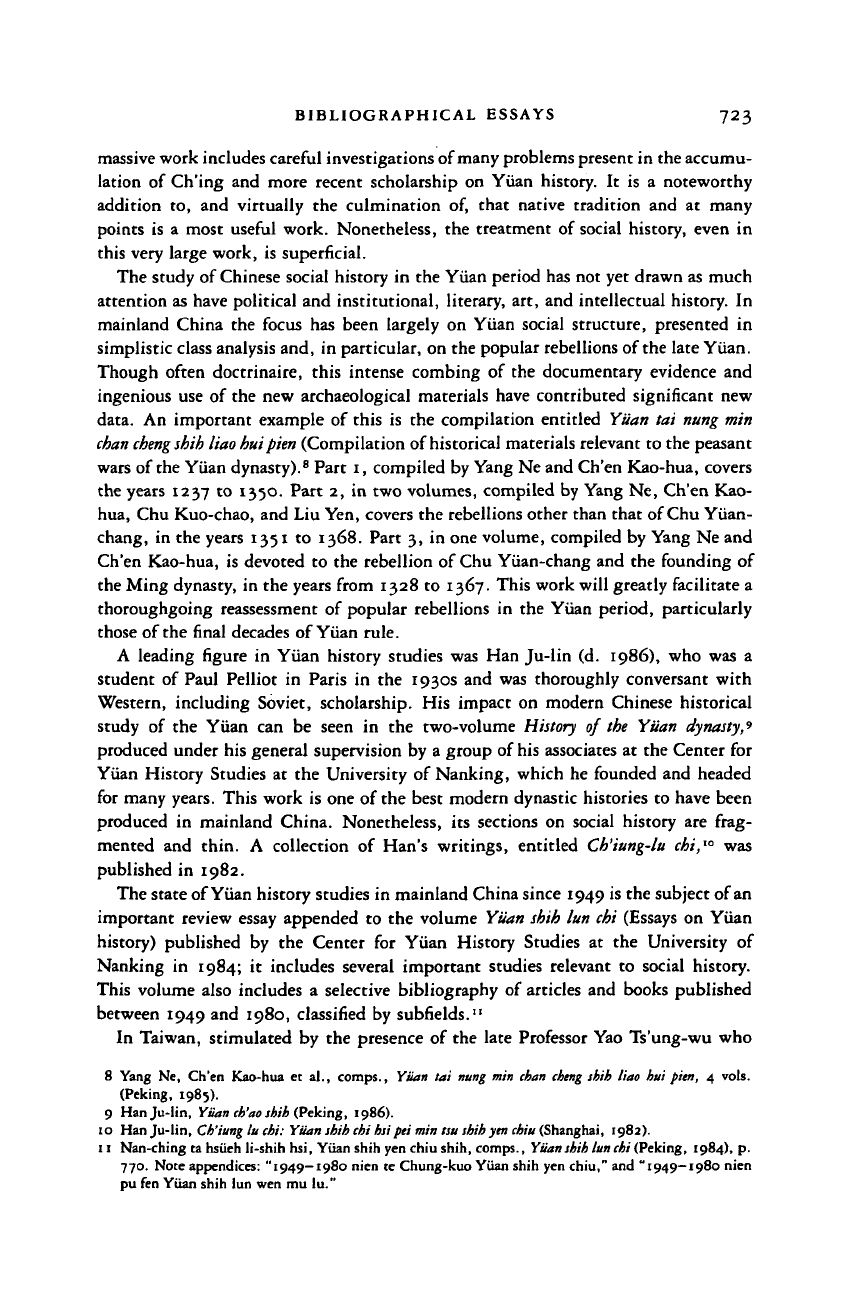
BIBLIOGRAPHICAL ESSAYS 723
massive work includes careful investigations of many problems present in the accumu-
lation of Ch'ing and more recent scholarship on Yuan history. It is a noteworthy
addition to, and virtually the culmination of, that native tradition and at many
points is a most useful work. Nonetheless, the treatment of social history, even in
this very large work, is superficial.
The study of Chinese social history in the Yuan period has not yet drawn as much
attention as have political and institutional, literary, art, and intellectual history. In
mainland China the focus has been largely on Yuan social structure, presented in
simplistic class analysis and, in particular, on the popular rebellions of
the
late Yuan.
Though often doctrinaire, this intense combing of the documentary evidence and
ingenious use of the new archaeological materials have contributed significant new
data. An important example of this is the compilation entitled Yuan tat
nung
min
chart chengshih liao buipien
(Compilation of historical materials relevant to the peasant
wars of the Yuan dynasty).
8
Part 1, compiled by Yang Ne and Ch'en Kao-hua, covers
the years 1237 to 1350. Part 2, in two volumes, compiled by Yang Ne, Ch'en Kao-
hua, Chu Kuo-chao, and Liu Yen, covers the rebellions other than that of Chu Yiian-
chang, in the years 1351 to 1368. Part 3, in one volume, compiled by Yang Ne and
Ch'en Kao-hua, is devoted to the rebellion of Chu Yiian-chang and the founding of
the Ming dynasty, in the years from 1328 to 1367. This work will greatly facilitate a
thoroughgoing reassessment of popular rebellions in the Yuan period, particularly
those of the final decades of Yiian rule.
A leading figure in Yiian history studies was Han Ju-lin (d. 1986), who was a
student of Paul Pelliot in Paris in the 1930s and was thoroughly conversant with
Western, including Soviet, scholarship. His impact on modern Chinese historical
study of the Yiian can be seen in the two-volume
History
of
the
Yiian
dynasty,*
produced under his general supervision by a group of
his
associates at the Center for
Yiian History Studies at the University of Nanking, which he founded and headed
for many years. This work is one of the best modern dynastic histories to have been
produced in mainland China. Nonetheless, its sections on social history are frag-
mented and thin. A collection of Han's writings, entitled
Ch'iung-lu
chi,
la
was
published in 1982.
The state of Yiian history studies in mainland China since 1949 is the subject of an
important review essay appended to the volume
Yiian shih
lun
chi
(Essays on Yiian
history) published by the Center for Yiian History Studies at the University of
Nanking in 1984; it includes several important studies relevant to social history.
This volume also includes a selective bibliography of articles and books published
between 1949 and 1980, classified by subfields."
In Taiwan, stimulated by the presence of the late Professor Yao Ts'ung-wu who
8 Yang Ne, Ch'en Kao-hua et al., comps., Yiian tai nung min chan chtng shih liao hui pien, 4 vols.
(Peking, 1985).
9 Han Ju-lin, Yiian
ch'ao
shih (Peking, 1986).
10 Han Ju-lin, Ch'iung lu chi: Yiian shih chi hsi pei min tsu shih
yen
chiu (Shanghai, 1982).
11 Nan-ching ta hsiieh li-shih hsi, Yiian shih yen chiu shih, comps., Yiian
shih
lun chi (Peking, 1984), p.
770.
Note appendices: "1949—1980 nien te Chung-kuo Yiian shih yen chiu," and "1949—1980 nien
pu fen Yiian shih lun wen mu lu."
Cambridge Histories Online © Cambridge University Press, 2008
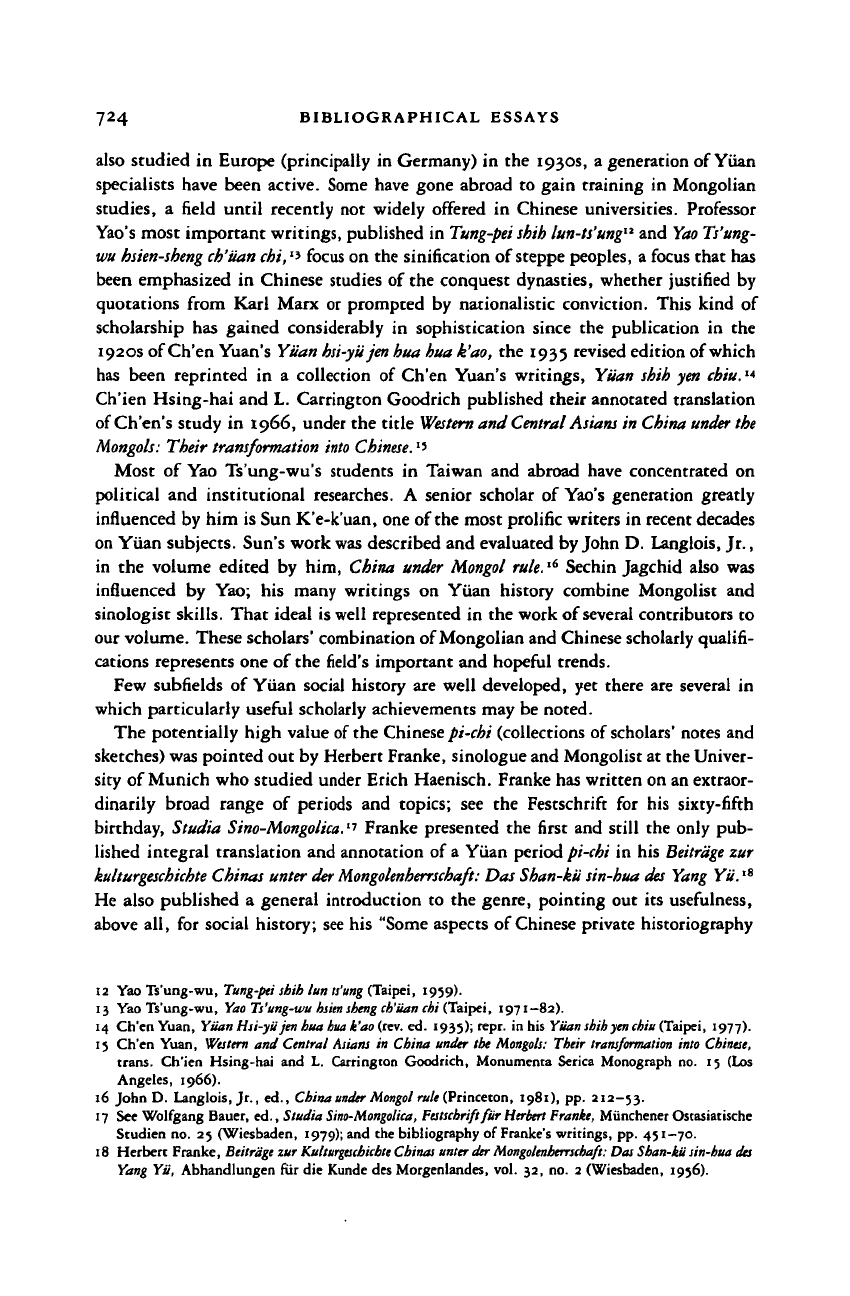
724 BIBLIOGRAPHICAL ESSAYS
also studied in Europe (principally in Germany) in the 1930s, a generation of Yuan
specialists have been active. Some have gone abroad to gain training in Mongolian
studies, a field until recently not widely offered in Chinese universities. Professor
Yao's most important writings, published in
Tung-pei shih
lun-ts'ung
12
and
Yao
Ts'ung-
wu
hsien-sheng ch'iian
chi,
1
* focus on the sinification of steppe peoples, a focus that has
been emphasized in Chinese studies of the conquest dynasties, whether justified by
quotations from Karl Marx or prompted by nationalistic conviction. This kind of
scholarship has gained considerably in sophistication since the publication in the
1920s of Ch'en Yuan's Yuan bsi-yiijen hua hua
k'ao,
the 1935 revised edition of which
has been reprinted in a collection of Ch'en Yuan's writings, Yuan shih yen
chiu,
•«
Ch'ien Hsing-hai and L. Carrington Goodrich published their annotated translation
of Ch'en's study in 1966, under the title
Western
and
Central Asians
in China
under the
Mongols:
Their
transformation into
Chinese.
I5
Most of Yao Ts'ung-wu's students in Taiwan and abroad have concentrated on
political and institutional researches. A senior scholar of Yao's generation greatly
influenced by him is Sun K'e-k'uan, one of the most prolific writers in recent decades
on Yuan subjects. Sun's work was described and evaluated by John D. Langlois, Jr.,
in the volume edited by him, China under Mongol rule.
l6
Sechin Jagchid also was
influenced by Yao; his many writings on Yuan history combine Mongolist and
sinologist skills. That ideal is well represented in the work of several contributors to
our volume. These scholars' combination of Mongolian and Chinese scholarly qualifi-
cations represents one of the field's important and hopeful trends.
Few subfields of Yuan social history are well developed, yet there are several in
which particularly useful scholarly achievements may be noted.
The potentially high value of the Chinese pi-chi (collections of
scholars'
notes and
sketches) was pointed out by Herbert Franke, sinologue and Mongolist at the Univer-
sity of Munich who studied under Erich Haenisch. Franke has written on an extraor-
dinarily broad range of periods and topics; see the Festschrift for his sixty-fifth
birthday, Studia
Sino-Mongolica.
•' Franke presented the first and still the only pub-
lished integral translation and annotation of a Yuan period pi-chi in his
Beitrage
zur
kulturgeschichte Chinas unter der Mongolenberrschaft: Das Shan-kit sin-hua des Yang Yii.
l8
He also published a general introduction to the genre, pointing out its usefulness,
above all, for social history; see his "Some aspects of Chinese private historiography
12 Yao Ts'ung-wu, Tung-pei shih lun tt'»»g (Taipei, 1959).
13 Yao Ts'ung-wu, Yao Ts'ung-wu
hsitn
shaig
ch'iian
cbi (Taipei, 1971—82).
14 Ch'en Yuan, Yiian Hsi-yii jen hua
hua
k'ao (rev. ed. 1935); repr. in his Yiiansbihyen
chiu
(Taipei, 1977).
15 Ch'en Yuan,
Western
and Central Asians in China under the
Mongols:
Their
transformation
into Chinese,
trans.
Ch'ien Hsing-hai and L. Carrington Goodrich, Monumenta Serica Monograph no. 15 (Los
Angeles, 1966).
16 John D. Langlois, Jr., ed., China
under
Mongol rule (Princeton, 1981), pp. 212-53.
17 See Wolfgang Bauer, ed., Studia
Sino-Mongolica,
Festschrift fur
Herbert
Franke, Miinchener Ostasiatische
Studien no. 25 (Wiesbaden, 1979); and the bibliography of Frankc's writings, pp. 4)1-70.
18 Herbert Franke, Beitrage zur
Kulturgescbicbte
Chinas unter der
Mongolenherrschaft:
Das
Shan-kii sin-hua des
Yang Yii, Abhandlungen fur die Kunde des Morgenlandes, vol. 32, no. 2 (Wiesbaden, 19)6).
Cambridge Histories Online © Cambridge University Press, 2008
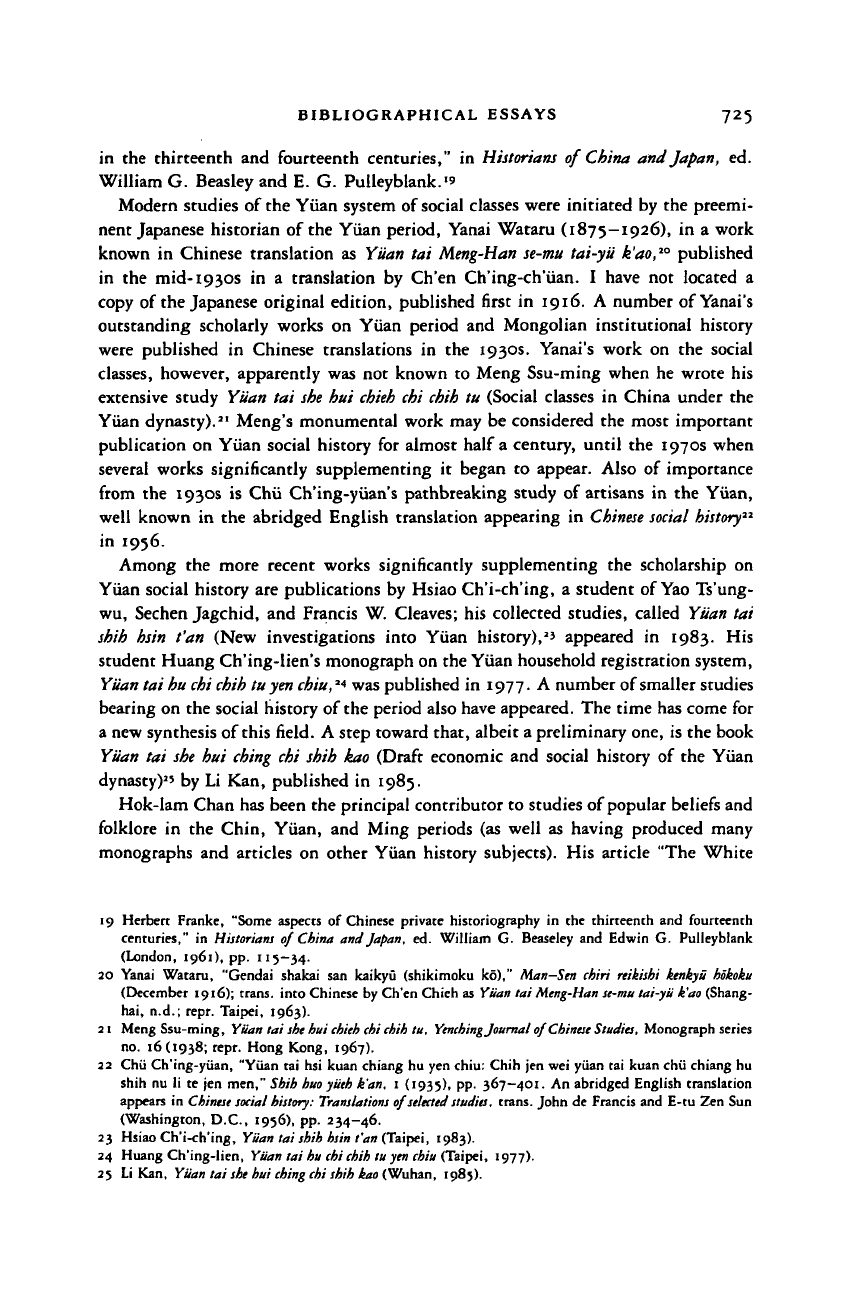
BIBLIOGRAPHICAL ESSAYS 725
in the thirteenth and fourteenth centuries," in
Historians
of
China
and Japan, ed.
William G. Beasley and E. G. Pulleyblank."
Modern studies of the Yuan system of
social
classes were initiated by the preemi-
nent Japanese historian of the Yuan period, Yanai Wataru (1875—1926), in a work
known in Chinese translation as Yuan tai
Meng-Han se-mu
tai-yii
k'ao,™
published
in the mid-i93OS in a translation by Ch'en Ch'ing-ch'iian. I have not located a
copy of the Japanese original edition, published first in 1916. A number of Yanai's
outstanding scholarly works on Yuan period and Mongolian institutional history
were published in Chinese translations in the 1930s. Yanai's work on the social
classes, however, apparently was not known to Meng Ssu-ming when he wrote his
extensive study Yiian tai
she
hui
chieh chi chih
tu (Social classes in China under the
Yuan dynasty).
21
Meng's monumental work may be considered the most important
publication on Yiian social history for almost half a century, until the 1970s when
several works significantly supplementing it began to appear. Also of importance
from the 1930s is Chii Ch'ing-yiian's pathbreaking study of artisans in the Yiian,
well known in the abridged English translation appearing in
Chinese social
history
21
in 1956.
Among the more recent works significantly supplementing the scholarship on
Yiian social history are publications by Hsiao Ch'i-ch'ing, a student of
Yao
Ts'ung-
wu, Sechen Jagchid, and Francis W. Cleaves; his collected studies, called
Yiian
tai
shih hsin t'an (New investigations into Yiian history),
2
* appeared in 1983. His
student Huang Ch'ing-lien's monograph on the Yiian household registration system,
Yiian
tai
hu chi chih tu yen chiu,'«
was published in 1977. A number of smaller studies
bearing on the social history of the period also have appeared. The time has come for
a new synthesis of this field. A step toward that, albeit a preliminary one, is the book
Yiian tai
she
hui
ching
chi shih kao (Draft economic and social history of the Yiian
dynasty)
2
' by Li Kan, published in 1985.
Hok-lam Chan has been the principal contributor to studies of popular beliefs and
folklore in the Chin, Yiian, and Ming periods (as well as having produced many
monographs and articles on other Yiian history subjects). His article "The White
19 Herbert Franke, "Some aspects of Chinese private historiography in the thirteenth and fourteenth
centuries," in
Historians
of
China
and Japan, ed. William G. Beaseley and Edwin G. Pulleyblank
(London, 1961), pp. 115—34.
20 Yanai wataru, "Gendai shakai san kaikyu (shikimoku ko)," Man-Sen chiri
reikisbi
kenkyu
hokoku
(December 1916); trans, into Chinese by Ch'en Chieh as
Yiian
tai
Meng-Han se-mu tai-yii
k'ao
(Shang-
hai,
n.d.; repr. Taipei, 1963).
21 Meng Ssu-ming,
Yiian
tai
she
hui
chieh chi chih
tu, Yenching
Journal
0/Chinese
Studies,
Monograph series
no.
16(1938; repr. Hong Kong, 1967).
22 Chii Ch'ing-yiian, "Yiian tai hsi kuan Chiang hu yen chiu: Chih jen wei yuan tai kuan chii chiang hu
shih nu li te jen men," Shih
huoyiieh
i'an, 1 (1935), pp.
367—401.
An abridged English translation
appears in
Chinese social
history:
Translations
of
selected
studies,
trans. John de Francis and E-tu Zen Sun
(Washington, D.C., 1956), pp. 234-46.
23 Hsiao Ch'i-ch'ing,
Yiian
tai
shih hsin
t'an (Taipei, 1983).
24 Huang Ch'ing-lien, Yuan tai
hu chi chih tu yen chiu
(Taipei,
1977).
25 Li Kan,
Yiian
tai
she
hui
ching chi shih kao
(Wuhan, 1985).
Cambridge Histories Online © Cambridge University Press, 2008
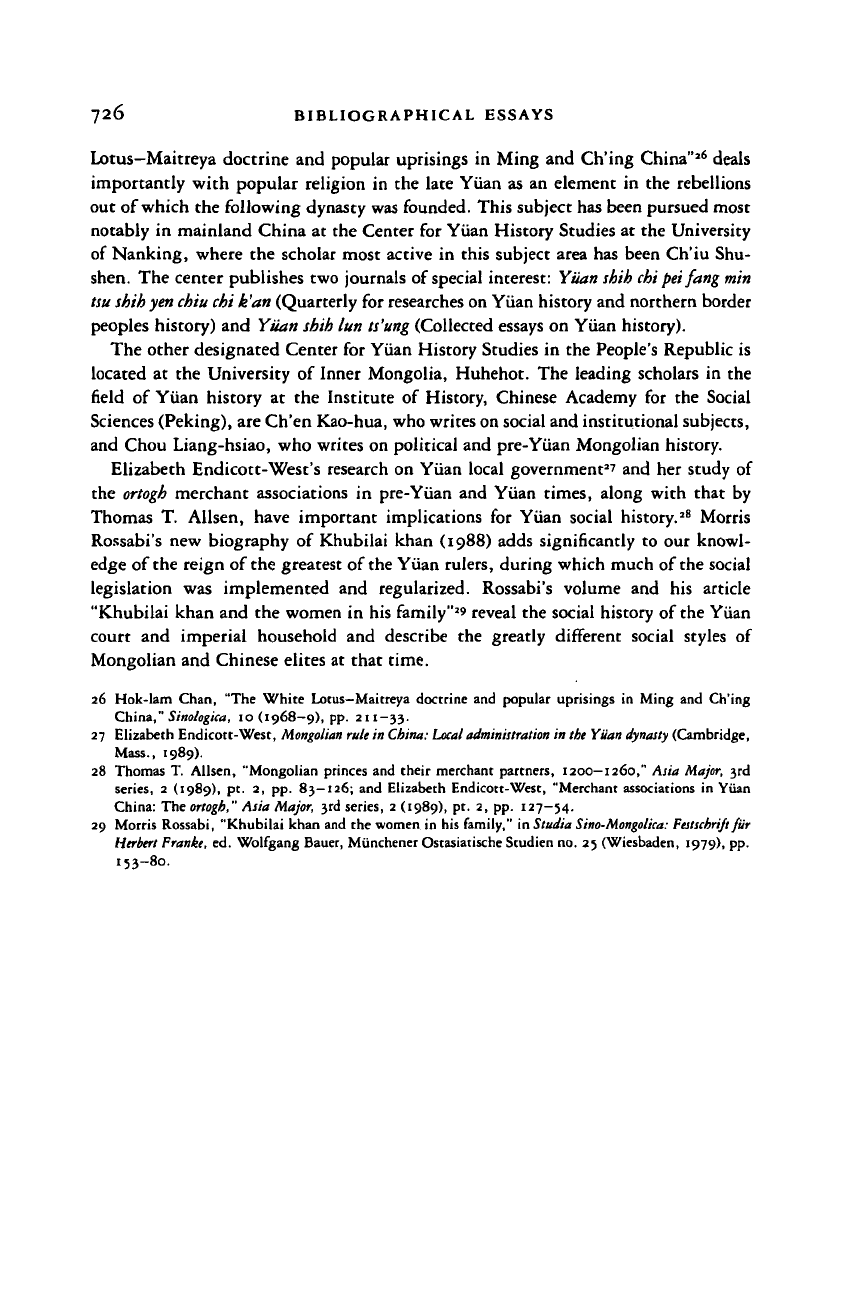
726 BIBLIOGRAPHICAL ESSAYS
Lotus—Maitreya doctrine and popular uprisings in Ming and Ch'ing China"
26
deals
importantly with popular religion in the late Yuan as an element in the rebellions
out of which the following dynasty was founded. This subject has been pursued most
notably in mainland China at the Center for Yuan History Studies at the University
of Nanking, where the scholar most active in this subject area has been Ch'iu Shu-
shen. The center publishes two journals of special interest: Yuan shih chi pet fang min
tsu shih yen chiu chi k'an (Quarterly for researches on Yuan history and northern border
peoples history) and Yuan shih lun ts'ung (Collected essays on Yuan history).
The other designated Center for Yuan History Studies in the People's Republic is
located at the University of Inner Mongolia, Huhehot. The leading scholars in the
field of Yuan history at the Institute of History, Chinese Academy for the Social
Sciences (Peking), are Ch'en Kao-hua, who writes on social and institutional subjects,
and Chou Liang-hsiao, who writes on political and pre-Yiian Mongolian history.
Elizabeth Endicott-West's research on Yuan local government
2
' and her study of
the ortogh merchant associations in pre-Yuan and Yuan times, along with that by
Thomas T. Allsen, have important implications for Yuan social history.
28
Morris
Rossabi's new biography of Khubilai khan (1988) adds significantly to our knowl-
edge of the reign of the greatest of the Yuan rulers, during which much of the social
legislation was implemented and regularized. Rossabi's volume and his article
"Khubilai khan and the women in his family"
29
reveal the social history of the Yuan
court and imperial household and describe the greatly different social styles of
Mongolian and Chinese elites at that time.
26
Hok-lam
Chan, "The
White Lotus—Maitreya doctrine
and
popular uprisings
in
Ming
and
Ch'ing
China,"
Sinologica,
10 (1968—9), pp. 211-33.
27
Elizabeth
Endicott-West,
Mongolian rule
in China:
Local administration
in the
Yuan dynasty
(Cambridge,
Mass., 1989).
28
Thomas
T. Allsen,
"Mongolian princes
and
their merchant
partners, 1200—1260,"
Asia
Major,
3rd
series, 2 (1989), pt. 2, pp. 83—126; and
Elizabeth
Endicott-West,
"Merchant associations
in
Yuan
China: The
ortogh,"
Asia
Major,
3rd series, 2 (1989), pt. 2, pp. 127-54.
29
Morris
Rossabi,
"Khubilai khan
and the
women
in his family," in
Studia
Sino-Mongolica:
Festschrift
fur
Herbert
Franke,
ed.
Wolfgang
Bauer,
Miinchener Ostasiatische Scudien
no. 2; (Wiesbaden, 1979), pp.
153-80.
Cambridge Histories Online © Cambridge University Press, 2008
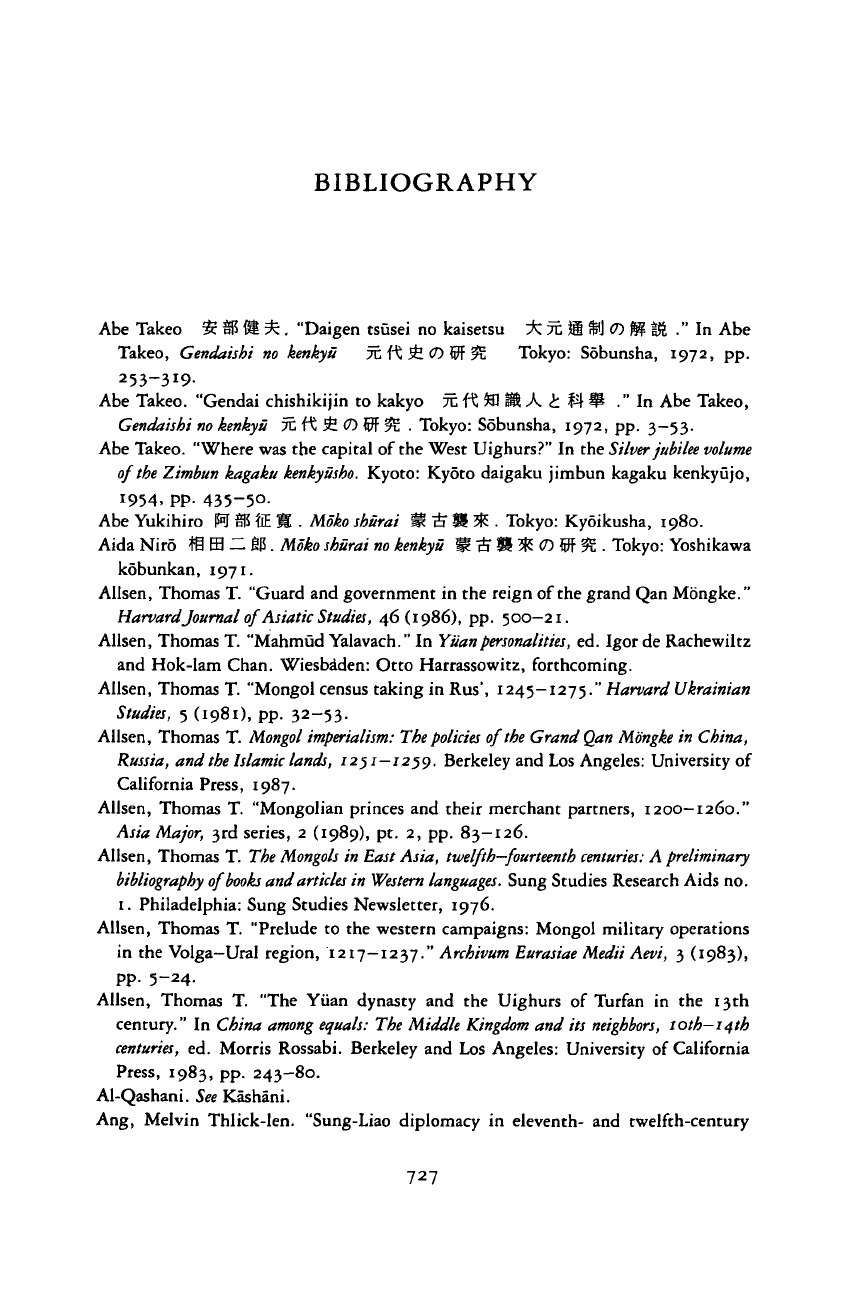
BIBLIOGRAPHY
Abe Takeo $
SB
11 * . "Daigen tsusei no kaisetsu ~k
7C
j® ffl
CO
f%
Ift ." In Abe
Takeo, Gendaishi no kenkyii
TC
iX i
CO 5JF
5E Tokyo: Sobunsha, 1972, pp.
253-319.
Abe Takeo. "Gendai chishikijin to kakyo
7C
iX
&J
$ A i ?4 # ."In Abe Takeo,
Gendaishi no kenkyii
7C
ft !fe
CO
5ff 2E . Tokyo: Sobunsha, 1972, pp. 3-53.
Abe Takeo. "Where was the capital of the West Uighurs?" In the Silver jubilee
volume
of the Zimbun kagaku
kenkyusho.
Kyoto: Ky5to daigaku jimbun kagaku kenkyujo,
1954,
pp. 435-50.
Abe Yukihiro ffl 95 ffi % . Moko shurai
M~^^k%.
Tokyo: Kyoikusha, 1980.
Aida Niro til ffl — %.
Moko
shurai
no
kenkyii M S S
5K CO
ffl
% . Tokyo: Yoshikawa
kobunkan, 1971.
Allsen, Thomas T. "Guard and government in the reign of the grand Qan Mbngke."
Harvard Journal of Asiatic
Studies,
46(1986), pp.
500—21.
Allsen, Thomas T. "Mahmud Yalavach." In Yuan
personalities,
ed. Igor de Rachewiltz
and Hok-lam Chan. Wiesbaden: Otto Harrassowitz, forthcoming.
Allsen, Thomas T. "Mongol census taking in Rus', 1245—1275." Harvard Ukrainian
Studies, 5 (1981), pp.
32-53.
Allsen, Thomas T. Mongol
imperialism:
The
policies
of the Grand
Qan Mbngke
in China,
Russia, and
the
Islamic lands, 1251—1259. Berkeley and Los Angeles: University of
California Press, 1987.
Allsen, Thomas T. "Mongolian princes and their merchant partners, 1200-1260."
Asia Major, 3rd series, 2 (1989), pt. 2, pp. 83-126.
Allsen, Thomas T. The
Mongols
in East Asia,
twelfth—fourteenth
centuries:
A preliminary
bibliography
of
books
and
articles
in
Western
languages.
Sung Studies Research Aids no.
1.
Philadelphia: Sung Studies Newsletter, 1976.
Allsen, Thomas T. "Prelude to the western campaigns: Mongol military operations
in the Volga—Ural region, 1217-1237." Archivum Eurasiae Medii Aevi, 3 (1983),
pp.
5-24.
Allsen, Thomas T. "The Yuan dynasty and the Uighurs of Turfan in the 13th
century." In China among
equals:
The Middle Kingdom and its
neighbors,
10th-14th
centuries, ed. Morris Rossabi. Berkeley and Los Angeles: University of California
Press,
1983, pp. 243-80.
Al-Qashani.
See
Kashani.
Ang, Melvin Thlick-len. "Sung-Liao diplomacy in eleventh- and twelfth-century
727
Cambridge Histories Online © Cambridge University Press, 2008
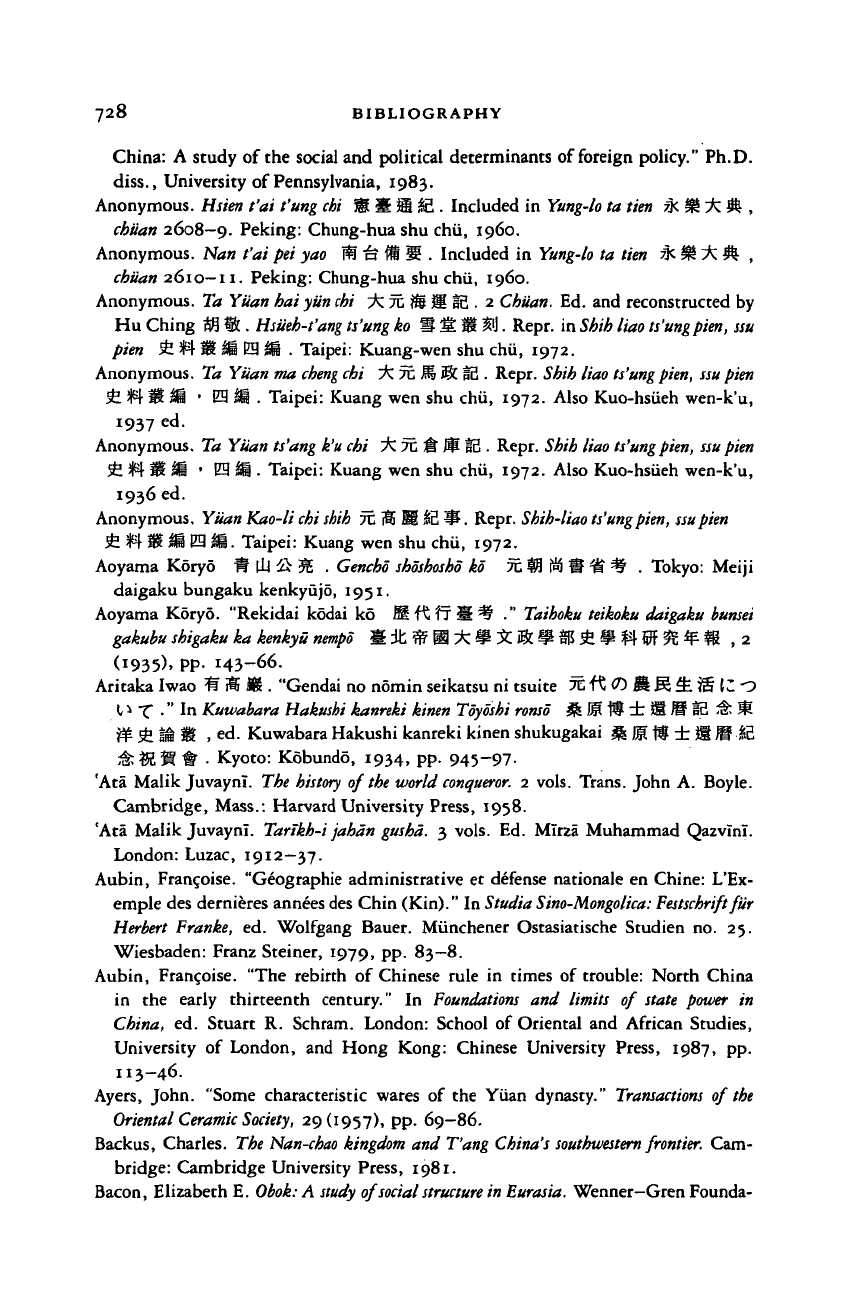
728 BIBLIOGRAPHY
China: A study of the social and political determinants of foreign policy." Ph.D.
diss.,
University of Pennsylvania, 1983.
Anonymous. Hsien t'ai t'ung
chi
58 S ffi & . Included in
Yung-lo
ta tien ac
9k ~K
ift ,
chiian
2608—9. Peking: Chung-hua shu chii, i960.
Anonymous. Nan t'ai pei yao M i3 fit W . Included in
Yung-lo
ta tien
*K $& ^C
#i ,
chiian
2610—11.
Peking: Chung-hua shu chii, i960.
Anonymous. Ta
Yiian
hai
yiin chi
^
7C
M M 15 . 2
Chiian.
Ed. and reconstructed by
Hu Ching
$ft
W..
Hsiieh-t'ang ts'ung ko
1S SIJ. Repr. in
Shih
liao
ts'ungpien,
ssu
pien i. #4 ^ H H H . Taipei: Kuang-wen shu chii, 1972.
Anonymous. Ta Yiian ma
cheng chi ~fc ?E
MI
3fc 13 . Repr. Shih liao
ts'ungpien,
ssu pien
$L
Pi HM '
E3
S . Taipei: Kuang wen shu chii, 1972. Also Kuo-hsiieh wen-k'u,
1937 ed.
Anonymous. Ta Yiian ts'ang
k'u
chi 'X
7C
M M IB . Repr. Shih liao
ts'ungpien,
ssu pien
£ ft M M '
E3 £§
. Taipei: Kuang wen shu chii, 1972. Also Kuo-hsiieh wen-k'u,
1936 ed.
Anonymous, Yiian Kao-li
chi shih
ft B H & V. Repr.
Shih-liao
ts'ungpien,
ssu pien
£
14
% M
E3
H. Taipei: Kuang wen shu chii, 1972.
Aoyama Koryo W
UJ
& % .
Gencho shoshosho
ko
7C
la
(Si
# ^ # . Tokyo: Meiji
daigaku bungaku kenkyujo, 1951.
Aoyama Koryo. "Rekidai kodai ko M ft fr M % ."
Taihoku teikoku
daigaku
bunsei
gakubushigaku ka kenkyu
nempo
X it » PI * 9 X ft PSB it 9 $4 W * ¥ tt ,2
(1935).
PP- 143-66.
Aritaka Iwao
W iS5
J8 . "Gendai no nomin seikatsu ni tsuite
I
*
X •" 1° Kuwabara
Hakushi
kanreki
kinen Toyoshi ronso
# £ H H , ed. Kuwabara Hakushi kanreki kinen shukugakai H H If
^liSf.
Kyoto: Kobundo, 1934, pp. 945~97-
'Ata Malik Juvaynl. TAe ^M/ory of
the world
conqueror.
2 vols. Trans. John A. Boyle.
Cambridge, Mass.: Harvard University Press, 1958.
'Ata Malik Juvayni.
Tartkh-i jahan
gushd.
3 vols. Ed. MIrza Muhammad Qazvlni.
London: Luzac, 1912—37.
Aubin, Franchise. "G£ographie administrative et defense nationale en Chine: L'Ex-
emple des dernieres annees des Chin (Kin)." In
Studia
Sino-Mongolica:
Festschrift fur
Herbert
Franke,
ed. Wolfgang Bauer. Miinchener Ostasiatische Studien no. 25.
Wiesbaden: Franz Steiner, 1979, pp.
83—8.
Aubin, Franchise. "The rebirth of Chinese rule in times of trouble: North China
in the early thirteenth century." In Foundations and limits of state power in
China, ed. Stuart R. Schram. London: School of Oriental and African Studies,
University of London, and Hong Kong: Chinese University Press, 1987, pp.
113-46.
Ayers, John. "Some characteristic wares of the Yiian dynasty."
Transactions
of
the
Oriental Ceramic
Society,
29(1957), pp. 69-86.
Backus, Charles.
The Nan-chao kingdom
and
T'ang
China's southwestern
frontier.
Cam-
bridge: Cambridge University Press, 1981.
Bacon, Elizabeth E.
Obok:
A
study
of
social structure
in
Eurasia.
Wenner—Gren Founda-
Cambridge Histories Online © Cambridge University Press, 2008
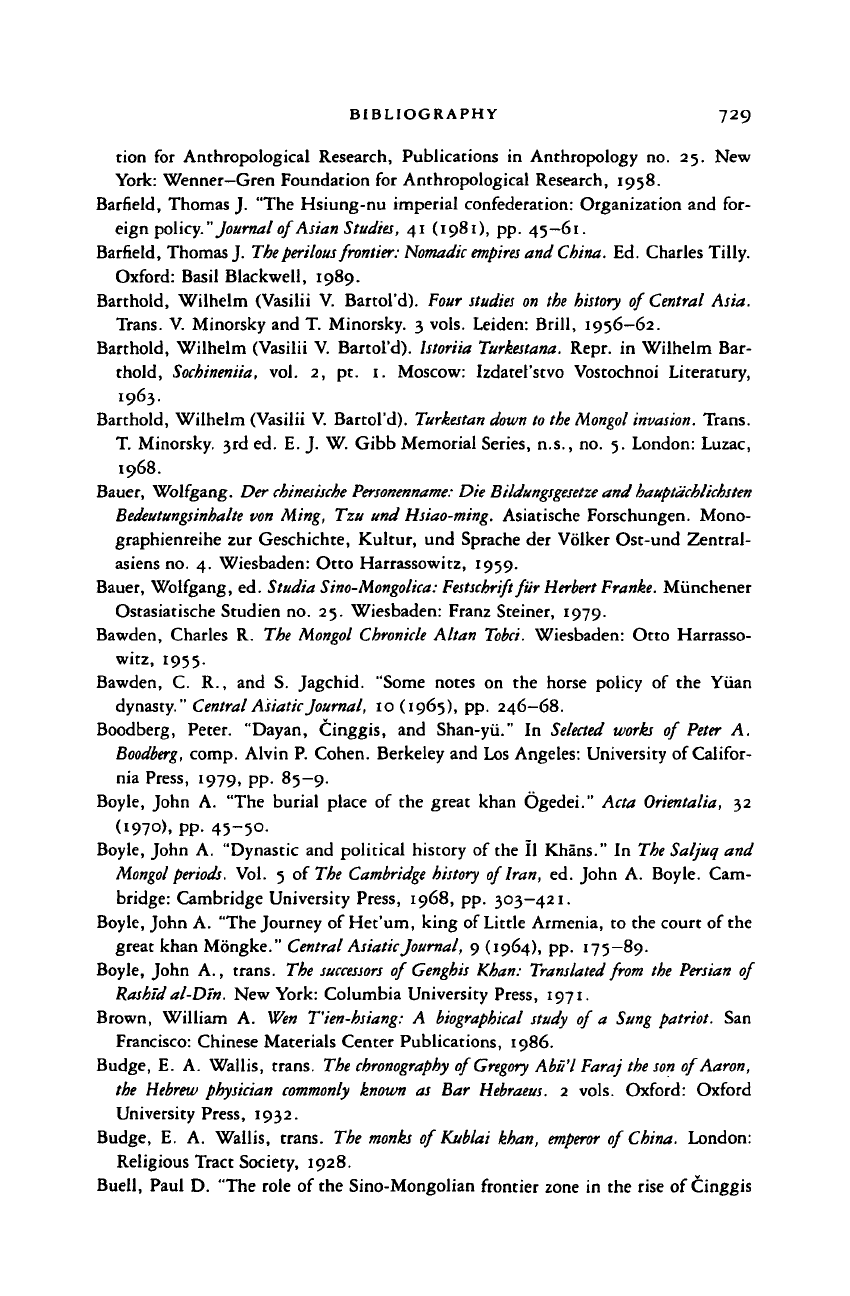
BIBLIOGRAPHY 729
tion for Anthropological Research, Publications in Anthropology no. 25. New
York: Wenner—Gren Foundation for Anthropological Research, 1958.
Barfield, Thomas J. "The Hsiung-nu imperial confederation: Organization and for-
eign policy." Journal of Asian Studies, 41 (1981), pp.
45—61.
Barfield, Thomas J. The perilous frontier: Nomadic
empires
and China. Ed. Charles Tilly.
Oxford: Basil Blackwell, 1989.
Barthold, Wilhelm (Vasilii V. Bartol'd). Four studies on the history of Central Asia.
Trans.
V. Minorsky and T. Minorsky. 3 vols. Leiden: Brill, 1956-62.
Barthold, Wilhelm (Vasilii V. Bartol'd). Istoriia Turkestana. Repr. in Wilhelm Bar-
thold, Sochineniia, vol. 2, pt. 1. Moscow: Izdatel'stvo Vostochnoi Literatury,
1963.
Barthold, Wilhelm (Vasilii V. Bartol'd). Turkestan down to the
Mongol
invasion.
Trans.
T. Minorsky. 3rd ed. E. J. W. Gibb Memorial Series, n.s., no. 5. London: Luzac,
1968.
Bauer, Wolfgang. Der chinesische Personenname: Die Bildungsgesetze and hauptdchlichsten
Bedeutungsinhalte von Ming, Tzu und Hsiao-ming. Asiatische Forschungen. Mono-
graphienreihe zur Geschichte, Kultur, und Sprache der Volker Ost-und Zentral-
asiens no. 4. Wiesbaden: Otto Harrassowitz, 1959.
Bauer, Wolfgang, ed. Studia Sino-Mongolica: Festschrift fur Herbert Franke. Miinchener
Ostasiatische Studien no. 25. Wiesbaden: Franz Steiner, 1979.
Bawden, Charles R. The Mongol
Chronicle
Allan
Tobci.
Wiesbaden: Otto Harrasso-
witz, 1955.
Bawden, C. R., and S. Jagchid. "Some notes on the horse policy of the Yuan
dynasty." Central Asiatic Journal, 10 (1965), pp. 246—68.
Boodberg, Peter. "Dayan, Cinggis, and Shan-yii." In Selected works of Peter A.
Boodberg,
comp. Alvin P. Cohen. Berkeley and Los Angeles: University of Califor-
nia Press, 1979, pp. 85-9.
Boyle, John A. "The burial place of the great khan Ogedei." Ada Orient alia, 32
(1970),
pp. 45-5O-
Boyle, John A. "Dynastic and political history of the II Khans." In The Saljuq and
Mongol periods. Vol. 5 of The Cambridge history of Iran, ed. John A. Boyle. Cam-
bridge: Cambridge University Press, 1968, pp.
303-421.
Boyle, John A. "The Journey of Het'um, king of Little Armenia, to the court of the
great khan Mongke." Central Asiatic Journal, 9 (1964), pp. 175—89.
Boyle, John A., trans. The
successors
of Genghis Khan: Translated from the Persian of
Rashtdal-Dtn. New York: Columbia University Press, 1971.
Brown, William A. Wen T'ien-hsiang: A biographical study of a Sung patriot. San
Francisco: Chinese Materials Center Publications, 1986.
Budge, E. A. Wallis, trans. The chronography of Gregory Abu7 Faraj the son of Aaron,
the Hebrew physician commonly known as Bar Hebraeus. 2 vols. Oxford: Oxford
University Press, 1932.
Budge, E. A. Wallis, trans. The monks of Kublai khan, emperor of China. London:
Religious Tract Society, 1928.
Buell, Paul D. "The role of the Sino-Mongolian frontier zone in the rise of Cinggis
Cambridge Histories Online © Cambridge University Press, 2008
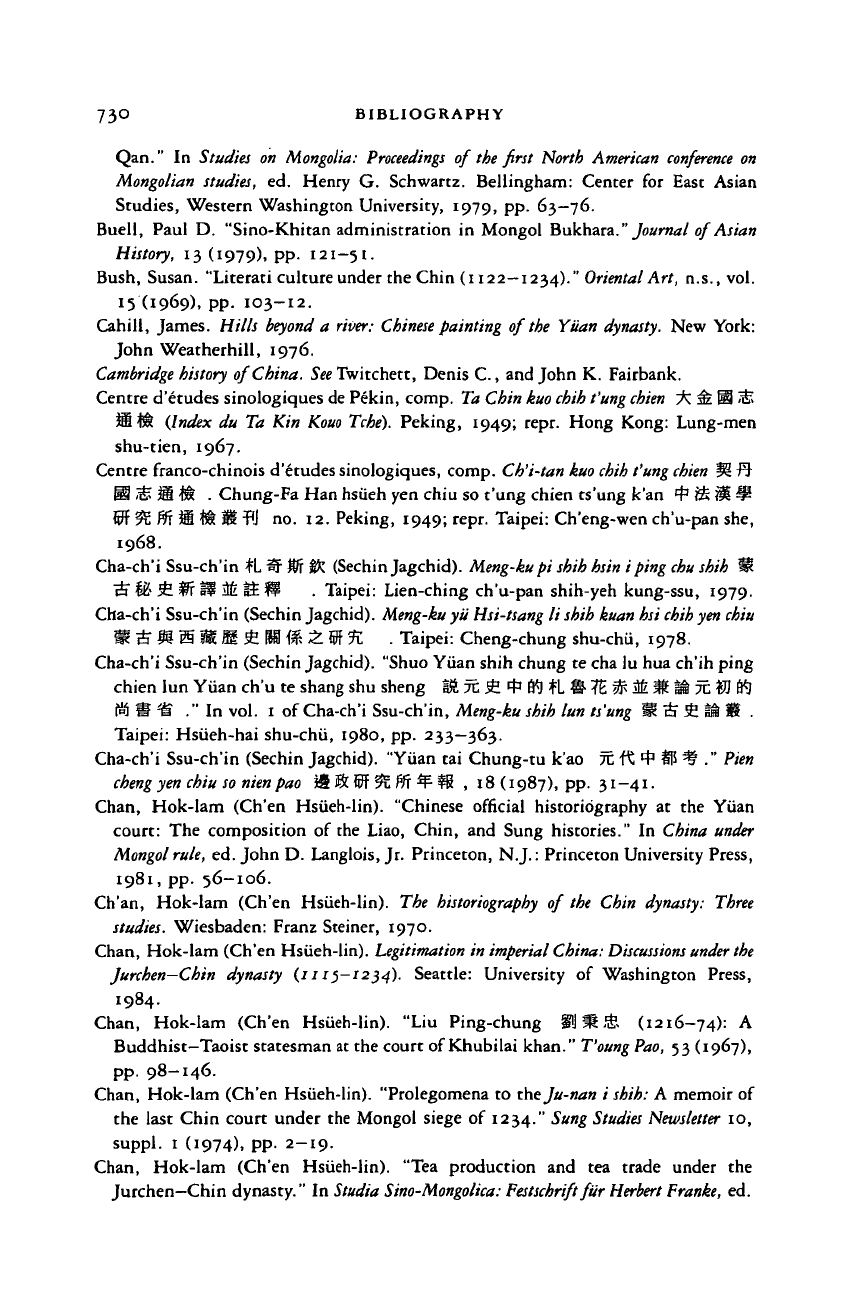
73° BIBLIOGRAPHY
Qan." In Studies on Mongolia: Proceedings of the first North American conference on
Mongolian
studies,
ed. Henry G. Schwartz. Bellingham: Center for East Asian
Studies, Western Washington University, 1979, pp. 63—76.
Buell, Paul D. "Sino-Khitan administration in Mongol Bukhara."
Journal
of
Asian
History, 13 (1979), pp.
121-51.
Bush, Susan. "Literati culture under the Chin (1122—1234)."
Oriental
Art, n.s., vol.
15 (1969). PP- 103-12.
Cahill, James. Hills
beyond
a
river:
Chinese painting
of
the
Yuan
dynasty.
New York:
John Weatherhill, 1976.
Cambridge history
of China.
See
Twitchett, Denis C., and John K. Fairbank.
Centre d'etudes sinologiques de Pekin, comp.
Ta Chin kuo chih
t'ung
chien
^. & H
SS
SH&
(.Index
du Ta Kin
Kouo
Tche).
Peking, 1949; repr. Hong Kong: Lung-men
shu-tien, 1967.
Centre franco-chinois d'etudes sinologiques, comp.
Ch'i-tan kuo chih
t'ung
chien
§§ ffl-
IH
/£ ffi ^ . Chung-Fa Han hsiieh yen chiu so t'ung chien ts'ung k'an 4
1
& M ^
fiff
3E ffc
M
tifc
M fJ no. 12. Peking, 1949; repr. Taipei: Ch'eng-wen ch'u-pan she,
1968.
Cha-ch'i Ssu-ch'in
+L
^f
Wi $K (Sechin
Jagchid).
Meng-kupi shih hsin
iping
chu shih
18
l5"lft£$ft?jKit!:S . Taipei: Lien-ching ch'u-pan shih-yeh kung-ssu, 1979.
Cha-ch'i Ssu-ch'in (Sechin
Jagchid).
Meng-ku yii Hsi-tsang
li
shih kuan hsi chih yen chiu
WS $$'fcW.ffi.%.M%2.W<% . Taipei: Cheng-chung shu-chu, 1978.
Cha-ch'i Ssu-ch'in (Sechin
Jagchid).
"Shuo Yuan shih chung te cha lu hua ch'ih ping
chien lun Yuan ch'u te shang shu sheng IftTni + fftfL^ft^^SftltTcSJW
f^ It
*M
."In vol. 1 of Cha-ch'i Ssu-ch'in,
Meng-ku shih
lun
ts'ung
W is £ It
Wi
.
Taipei: Hsiieh-hai shu-chii, 1980, pp. 233—363.
Cha-ch'i Ssu-ch'in (Sechin Jagchid). "Yuan tai Chung-tu k'ao
7C
f£ •£ IP % ."
Pien
cheng yen chiu so nien pao 19
&
ffl
% #f ¥
18
, 18(1987), pp.
31-41.
Chan, Hok-lam (Ch'en Hsiieh-lin). "Chinese official historiography at the Yuan
court: The composition of the Liao, Chin, and Sung histories." In
China under
Mongol
rule,
ed. John D. Langlois, Jr. Princeton, NJ.: Princeton University Press,
1981,
pp. 56-106.
Ch'an, Hok-lam (Ch'en Hsiieh-lin). The
historiography
of
the
Chin
dynasty:
Three
studies.
Wiesbaden: Franz Steiner, 1970.
Chan, Hok-lam (Ch'en Hsiieh-lin).
Legitimation
in
imperial
China:
Discussions under the
Jurchen—Chin
dynasty (1115-1234). Seattle: University of Washington Press,
1984.
Chan, Hok-lam (Ch'en Hsiieh-lin). "Liu Ping-chung §!l S-IS (1216-74): A
Buddhist-Taoist statesman at the court of Khubilai khan."
T'oung
Pao,
53 (1967),
pp.
98-146.
Chan, Hok-lam (Ch'en Hsiieh-lin). "Prolegomena to the Ju-nan i
shih:
A memoir of
the last Chin court under the Mongol siege of 1234."
Sung Studies Newsletter
10,
suppl. 1 (1974). PP- 2-19.
Chan, Hok-lam (Ch'en Hsiieh-lin). "Tea production and tea trade under the
Jurchen—Chin dynasty." In
Studia
Sino-Mongolica:
Festschrift fur
Herbert
Franke,
ed.
Cambridge Histories Online © Cambridge University Press, 2008
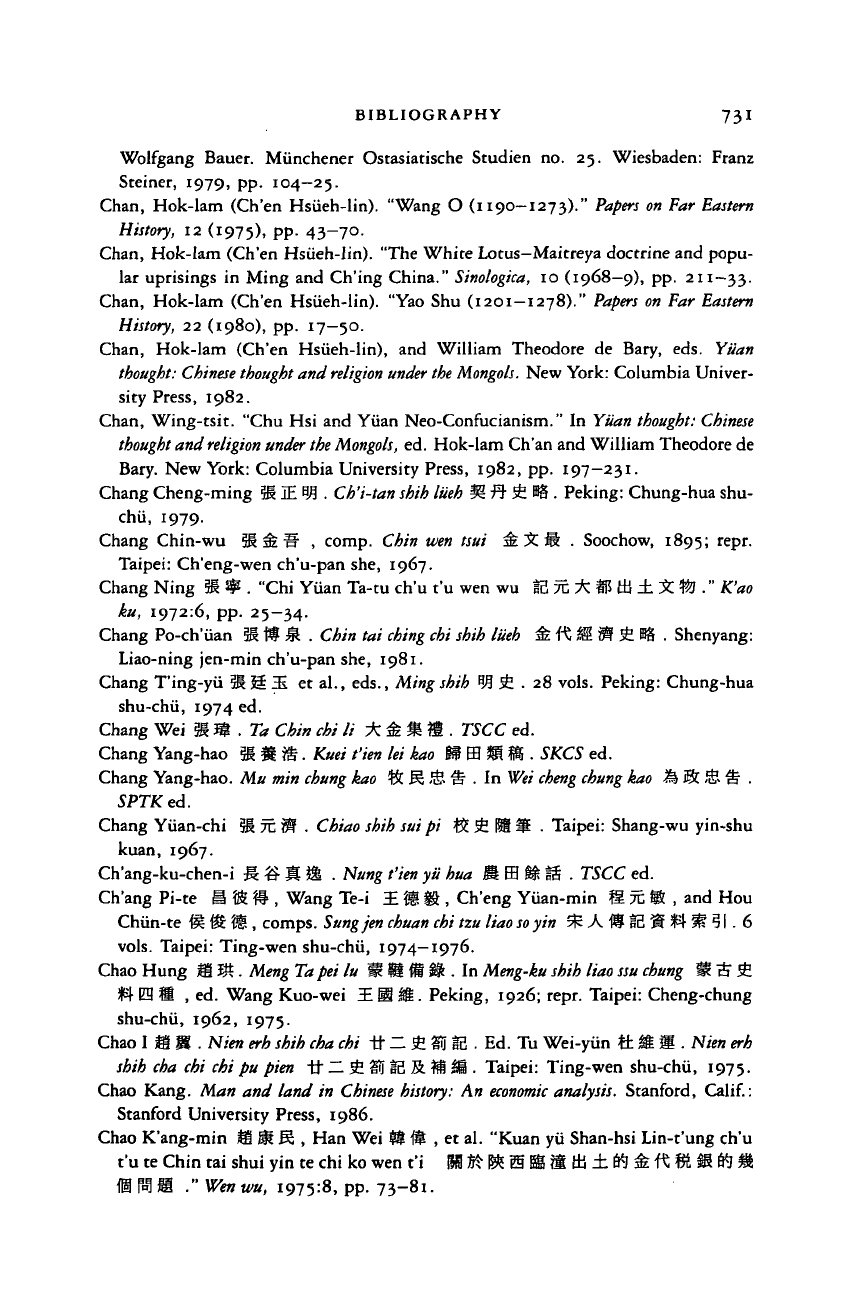
BIBLIOGRAPHY 731
Wolfgang Bauer. Miinchener Ostasiatische Studien no. 25. Wiesbaden: Franz
Steiner, 1979, pp. 104-25.
Chan, Hok-lam (Ch'en Hsiieh-lin). "Wang O (1190-1273)."
Papers on
Far
Eastern
History,
12 (1975), pp. 43-70.
Chan, Hok-lam (Ch'en Hsiieh-lin). "The White Lotus—Maitreya doctrine and popu-
lar uprisings in Ming and Ch'ing China."
Sinologka,
10 (1968—9), pp. 211—33.
Chan, Hok-lam (Ch'en Hsiieh-lin). "Yao Shu (1201—1278)."
Papers on
Far
Eastern
History,
22 (1980), pp. 17-50.
Chan, Hok-lam (Ch'en Hsiieh-lin), and William Theodore de Bary, eds. Yiian
thought:
Chinese
thought and
religion under the
Mongols.
New York: Columbia Univer-
sity Press, 1982.
Chan, Wing-tsit. "Chu Hsi and Yiian Neo-Confucianism." In
Yiian
thought:
Chinese
thought and religion under the
Mongols,
ed. Hok-lam Ch'an and William Theodore de
Bary. New York: Columbia University Press, 1982, pp.
197—231.
Chang Cheng-ming
5R
IE
B
M
.
Ch'i-tan shih liieh
% £r
$L B§
. Peking: Chung-hua shu-
chii,
1979.
Chang Chin-wu 3fi ^ H , comp. Chin
wen
tsui 4X1 . Soochow, 1895; repr.
Taipei: Ch'eng-wen ch'u-pan she, 1967.
Chang Ning
31
^ . "Chi Yuan Ta-tu ch'u t'u wen wu tBTC^ffltf^X^."
K'ao
ku,
1972:6, pp. 25-34.
Chang Po-ch'uan
3S W
H . Chin tai
ching chi shih liieh
£ ft
3£
if £
Bg
. Shenyang:
Liao-ning jen-min ch'u-pan she, 1981.
Chang T'ing-yii Igl et al., eds.,
Ming shih %M
$. . 28 vols. Peking: Chung-hua
shu-chii, 1974 ed.
Chang Wei
3g
it . Ta
Chin chi
li * £ * a . TSCC ed.
Chang Yang-hao
5g
£ jg
. Kuei
t'ien
lei kao
SS
ffl
&
4$
.
SKCS
ed.
Chang Yang-hao. Mu
min chung kao
ft S JS ff . In
Wei cheng chung kao
fe
£& 5&
•£ .
SPTKed.
Chang Yuan-chi
51 7E
iS . CArao
shih sui
pi RJif . Taipei: Shang-wu yin-shu
kuan, 1967.
Ch'ang-ku-chen-i I@Ii .
Nung
t'ien
yii
hua
8k
ffl
gfc
IS . T^CC ed.
Ch'ang Pi-te § & f§ , Wang Te-i I
S!
tg , Ch'eng Yiian-min S
7C @
, and Hou
Chiin-te ^
®:
^ , comps.
Sungjen chuan chi
tzu
liao so yin
^AffilH^^f^?!^
vols.
Taipei: Ting-wen shu-chii, 1974—1976.
Chao Hung
f&
8*
. Meng Ta pei
lu
W.
IS M & . In
Meng-ku shih liao ssu chung
fS$
^4
ES W
, ed. Wang Kuo-wei X
13
H. Peking, 1926; repr. Taipei: Cheng-chung
shu-chii, 1962, 1975.
Chao I jg M
•
Nien
erh shih cha chi
It ~ £
15 IB
. Ed. Tu Wei-yiin tt * S .
Nien erh
shih
cha
chi
chi
pu
pirn
it
— j& HI IB
&?$£§• Taipei: Ting-wen shu-chu, 1975.
Chao Kang. Ala» <j«</ /ana' /'«
Chinese
history:
An
economic
analysis.
Stanford,
Calif.:
Stanford University Press, 1986.
Chao K'ang-min S M
£§
, Han Wei $$
fiS
, et al. "Kuan yii Shan-hsi Lin-t'ung ch'u
t'u te Chin tai shui yin te chi ko wen t'i H St
1*5
S ffi S
Hi
±
W
^ ft ft iS
W
«
1975:8,
pp.
73-81.
Cambridge Histories Online © Cambridge University Press, 2008
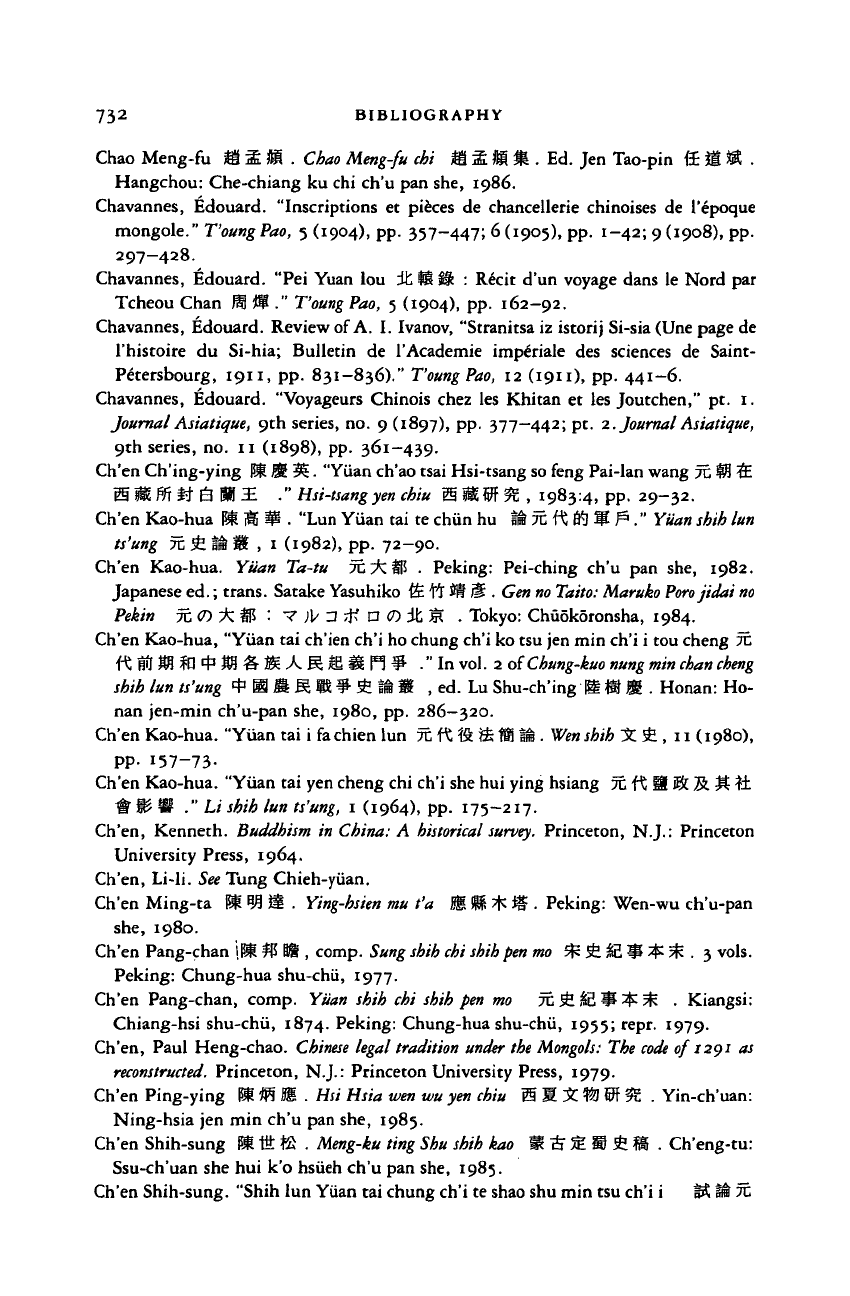
732 BIBLIOGRAPHY
Chao Meng-fu
21
i£ M .
Chao Meng-fu chi
ffi i£ M %.. Ed. Jen Tao-pin ffi it St .
Hangchou: Che-chiang ku chi ch'u pan she, 1986.
Chavannes, Edouard. "Inscriptions et pieces de chancellerie chinoises de l'epoque
mongole." Toung
Pao,
5 (1904), pp. 357-447; 6 (1905), pp. 1-42; 9 (1908), pp.
297-428.
Chavannes, Edouard. "Pei Yuan lou it
$8
IS : Ricit d'un voyage dans le Nord par
Tcheou Chan
JH
$? ." Toung
Pao,
5 (1904), pp. 162-92.
Chavannes, Edouard. Review of
A.
I. Ivanov, "Stranitsa iz istorij Si-sia (Une page de
l'histoire du Si-hia; Bulletin de l'Academie imperiale des sciences de Saint-
Petersbourg, 1911, pp. 831-836)."
T'oungPao,
12 (1911), pp. 441-6.
Chavannes, Edouard. "Voyageurs Chinois chez les Khitan et les Joutchen," pt. 1.
Journal
Asiatique,
9th series, no. 9 (1897), pp. 377—442; pt.
2.
Journal
Asiatique,
9th series, no. 11 (1898), pp. 361-439.
Ch'en Ch'ing-ying KS5I. "Yiian ch'ao tsai Hsi-tsang so feng Pai-lan wang
76 $9
ft
HHfifffef6S8i ."
Hsi-tsang yen chiu
B Mffi % , 1983:4, pp. 29-32.
Ch'en Kao-hua W ift M . "Lun Yiian tai te chiin hu fi % fi fft M P ."
Yiian shih lun
ts'ung
7C
£ H if , 1 (1982), pp. 72-90.
Ch'en Kao-hua. Yiian Ta-tu
7C ;*C 135
. Peking: Pei-ching ch'u pan she, 1982.
Japanese ed.; trans. Satake Yasuhiko ft TC 4f M .
Gen no
Taito:
Maruko Porojidai no
Pekin TCCO^tP: T;l/3^DCOit^ . Tokyo: ChuokSronsha, 1984.
Ch'en Kao-hua, "Yiian tai ch'ien ch'i ho chung ch'i ko tsu jen min ch'i i tou cheng 7t
ttwiMfQ'Pffl&teAg.&mn^- ."In vol.2 of
Chung-kuo nung min chan cheng
shih lun
ts'ung
+S,ftgi&?-5fef!l? , ed. Lu Shu-ch'ing B ffl M . Honan: Ho-
nan jen-min ch'u-pan she, 1980, pp. 286—320.
Ch'en Kao-hua. "Yuan tai i
fa
chien lun 7U
ft
'<&.
&
ffi?
It.
Wen shih
X £.,
11
(1980),
PP-
157-73-
Ch'en Kao-hua. "Yiian tai yen cheng chi ch'i she hui ying hsiang 7C ft H ife
2&
^ tt
# ^ W ." Li
shih
lun
ts'ung,
1 (1964), pp. 175—217.
Ch'en, Kenneth.
Buddhism
in
China:
A
historical
survey.
Princeton, N.J.: Princeton
University Press, 1964.
Ch'en, Li-li.
See
Tung Chieh-yiian.
Ch'en Ming-ta W
B
J it .
Ying-hsien mu
t'a M U * if . Peking: Wen-wu ch'u-pan
she,
1980.
Ch'en Pang-chan i$£ %
S®
, comp.
Sung shih chi shih pen mo
^£^^^7^.3 vols.
Peking: Chung-hua shu-chii, 1977.
Ch'en Pang-chan, comp. Yiian shih chi
shih pen
mo
7C
£ ffl
~9>
$ % . Kiangsi:
Chiang-hsi shu-chii, 1874. Peking: Chung-hua shu-chii, 1955; repr. 1979.
Ch'en, Paul Heng-chao.
Chinese
legal tradition under the
Mongols:
The
code
of 1291 as
reconstructed.
Princeton, N.J.: Princeton University Press, 1979.
Ch'en Ping-ying ffl. ffi M . Hit Hsia
wen tuu yen chiu
H
JE
X
%3 W
% . Yin-ch'uan:
Ning-hsia jen min ch'u pan she, 1985.
Ch'en Shih-sung
88
1t Jfi .
Meng-ku ting Shu shih kao
ISfiJi. Ch'eng-tu:
Ssu-ch'uan she hui k'o hsiieh ch'u pan she, 1985.
Ch'en Shih-sung. "Shih lun Yiian tai chung ch'i te shao shu min tsu ch'i i
1&
li
7C
Cambridge Histories Online © Cambridge University Press, 2008
